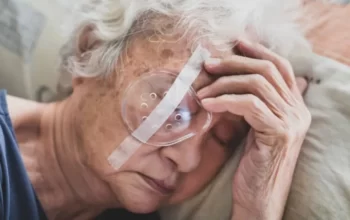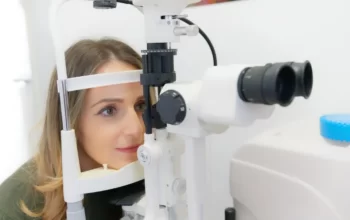
As people get older, they more frequently experience dry eyes and floaters.
Dry eye is a condition where the eyes don’t produce enough good tears to lubricate, clean, and moisturize their surface. If left untreated, this can result in vision issues and, in more severe cases, vision changes. Symptoms include redness, itching, and burning eyes.
Shapes that appear in the line of vision are called eye floaters. Although they can indicate a deeper problem, floaters are not dangerous.
Find out more about the causes, signs, and treatments of floaters and dry eye, as well as when to get medical help for either condition.
Dry Eyes And Floaters: What Causes Them?
The causes of dry eyes and floaters are as follows.
Dry Eyes
Several factors can cause someone to have dry eyes:
Poor Quality Of Tears
Tears have three layers: mucus, water, and oil. They add lubrication and protection, keep the tear film uniformly spread across the eye, and stop tears from evaporating.
Dry eyes can result from tears that evaporate too quickly or don’t adequately cover the eye if there is a problem with any one of these layers.
Insufficient Amount Of Tears
Tears are produced by glands in the eyelids. The glands’ tear production may be reduced by a number of factors, including:
- being over the age of 65
- certain medications, such as antihistamines, decongestants, antidepressants, and blood pressure drugs
- certain medical conditions, such as Sjögren’s syndrome, diabetes, rheumatoid arthritis, or thyroid conditions
- refractive eye surgery
- blockage of the meibomian glands
Other Causes
Additional elements that can result in dry eyes include:
- hormonal changes, such as pregnancy, menopause, or oral contraceptives
- blepharitis, which is an inflammation of the eyelids
- eyelids turning inwards or outwards
- long periods of screen time without regular blinking or breaks
- environmental conditions, such as wind, smoke, or dry climates
- using contact lenses long term
Floaters
Floaters develop when vitreous strands group together, casting shadows on the retina.
This can happen naturally as a person ages.
Floaters can occasionally also be a symptom of eye conditions like:
- eye infections or injuries
- inflammation of the eye
- bleeding in the eye
- vitreous detachment (the vitreous separates from the retina)
- retinal tear (vitreous detachment causes a hole to form in the retina)
- retinal detachment (the retina pulls away from the back of the eye)
People should seek medical attention right away if they have a retinal tear or detachment because it is a medical emergency.
Floaters can also occur as a result of other risk factors, such as:
- being very near-sighted
- having diabetes
- having had cataract surgery
Symptoms Of Dry Eyes And Floaters
It can be annoying to experience floaters or dry eye symptoms.
Symptoms Of Dry Eyes
The following are some of the signs of dry eye:
- Painful or burning sensation
- Feeling that there is something in your eye
- Redness
- Watery or mucousy eyes
- Blurry vision
Symptoms Of Floaters
Floaters can cause the following symptoms, among others:
- Squiggly lines, threads or cobwebs that disappear when you look directly at them
- Shapes that move, even when your eyes are still

Do Floaters Have Any Relation To Dry Eyes?
Floaters and dry eyes are unrelated. Tear synthesis and functionality are related to dry eye. People who have dry eyes either don’t produce enough tears or their tears evaporate too quickly. Dryness and irritation are the results of this.
Most frequently, normal aging-related changes in the eye are what cause floaters. Aging causes the vitreous humor to deteriorate and become more liquid, which allows particles to float more freely. Floaters, however, can also be a symptom of a more severe condition, such as retinal holes, tears, or detachment.
The two conditions aren’t connected, but because they both have a strong connection to aging, you might start experiencing them at the same time. Additionally, the conditions have some similar risk factors: for example, people with certain medical conditions like autoimmune diseases and those causing inflammation are at increased risk for both dry eye and floaters.
Treatment For Dry Eyes And Floaters
For your comfort and to prevent vision changes, it’s crucial to treat dry eye.
On the other hand, floaters don’t require any kind of care. However, you should see your healthcare provider immediately if you have increased floaters, flashes, blurred spot in vision, a curtain coming over vision.2
How To Treat Dry Eye
The cause of your dry eye will determine the best course of treatment. There are ways to manage the symptoms of dry eyes through lifestyle modifications. It may be helpful to limit screen time, drink plenty of water, wear sunglasses, and take vitamins and supplements.
Prescription eye drops that promote tear production or plugs for the tear ducts that slow down excessive tear drainage can also be used to treat dry eye. The best course of action for your dry eye condition can be decided upon during a telehealth visit or in-person consultation with a healthcare professional.
How To Treat Floaters
There is no need for treatment if floaters develop as you age. The course of treatment will depend on the underlying cause if they impair your vision or interfere with daily life.
An operation called a vitrectomy removes tissue clumps or floating objects from the vitreous fluid. Treatment of other causes of floaters, such as inflammation at the back of the eye, eye bleeding, eye surgeries, retinal tears, or retinal detachments, will eliminate the floaters.
YAG vitreolysis is a new treatment option for some types of floaters. The floater is vaporized during this process using a laser. Unfortunately, this is not applicable to all kinds of floaters.
Can Floaters Get Worse From Dehydration?
Behind the lens of your eye is a tissue that resembles gel that is called the vitreous humor. Given that it is 98% water, you can imagine what dehydration might do to this region of the eye. Insufficient water intake can cause the vitreous humor to shrink or change shape.
The proteins in the gel-like tissue of your eye may solidify rather than dissolve as they normally would, which could lead to an increase in the number of floaters. Therefore, staying hydrated is crucial for your overall health, including the health of your eyes!
Will Floaters Get Worse If They Drink Alcohol?
Did you know that excessive alcohol consumption can prematurely age the vitreous humor tissue in your eye? We all know that excessive alcohol consumption can be harmful to your health. When this occurs, your body may become activated, which may cause the emergence of eye floaters.
Your eye health as well as your general health and wellbeing can be greatly impacted by changing the amount of alcohol you consume.
Do Eye Drops Help With Floaters?
Unfortunately, floaters cannot be treated with eye drops. The good news is that the majority of eye floaters are completely untreatable. Although they may be inconvenient, you’ll quickly grow accustomed to them and most likely won’t even notice them the majority of the time.
Your eye doctor might recommend surgery to remove the floaters if you notice an increase in them or if you already have some that are too bothersome to ignore. However, you should be aware that option carries a sizable risk.
Conclusion
Age-related eye conditions that can develop include dry eye and floaters. The two ailments are unconnected, though. If you have dry eye, it’s important to talk to your doctor about your treatment options because, if untreated, the condition can cause damage to the surface of your eye and alter your vision. Although floaters are typically harmless, they may indicate a more serious medical issue. If they continue, seek medical attention.



